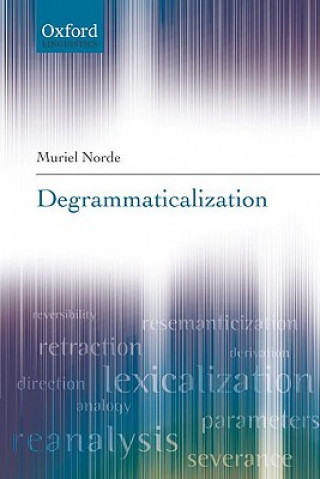
Code: 04529469
Degrammaticalization
by Muriel Norde
Grammaticalization is a well-attested process of linguistic change in which a lexical item becomes a function word, which may be further reduced to a clitic or affix. Proponents of the universality of grammaticalization have usual ... more
- Language:
 English
English - Binding: Hardback
- Number of pages: 290
Publisher: Oxford University Press, 2009
- More about this

You might also like
-

Extra Virginity
23.37 € -23 % -

Treatise on Human Nature
30.72 € -4 % -

Vorlesungen über neuere Geometrie
33.34 € -9 % -

The Faith Factor
14.50 € -

Secrets, Schemes and Sewing Machines
8.25 € -18 % -

Bacterial Physiology and Metabolism
71.63 € -

Ancient Appetites
14 € -18 %
Give this book as a present today
- Order book and choose Gift Order.
- We will send you book gift voucher at once. You can give it out to anyone.
- Book will be send to donee, nothing more to care about.
More about Degrammaticalization
You get 412 loyalty points
 Book synopsis
Book synopsis
Grammaticalization is a well-attested process of linguistic change in which a lexical item becomes a function word, which may be further reduced to a clitic or affix. Proponents of the universality of grammaticalization have usually argued that it is unidirectional and have thus found it a useful tool in linguistic reconstruction. In this book Prof Norde shows that change is reversible on all levels: semantic, morphological, syntactic, and phonological. As a consequence, the alleged unidirectionality of grammaticalization is not a reliable reconstructional tool, even if degrammaticalization is a rare phenomenon. Degrammaticalization, she argues, is essentially different from grammaticalization: it usually comprises a single change, examples being shifts from affix to clitic, or from function word to lexical item. And where grammaticalization can be seen as a process, degrammaticalization is often the by-product of other changes. Nevertheless, she shows that it can be described, like grammaticalization, in a principled way, in order to establish whether a change in a word has been from more to less grammatical or vice versa, and the stages by which it has become so. Using data from different languages she constructs a typology of degrammaticalization changes. She explains why degrammaticalization is so rare and why some linguists have such strongly negative feelings about the possibility of its existence. She adds to the understanding of grammaticalization and makes a significant contribution to methods of linguistic reconstruction and the study of language change. She writes clearly, aiming to be understood by advanced undergraduate students as well as appealing to scholars and graduate researchers in historical linguistics.
 Book details
Book details
Book category Books in English Language linguistics Historical & comparative linguistics
164.12 €
- Full title: Degrammaticalization
- Author: Muriel Norde
- Language:
 English
English - Binding: Hardback
- Number of pages: 290
- EAN: 9780199207923
- ISBN: 0199207925
- ID: 04529469
- Publisher: Oxford University Press
- Weight: 586 g
- Dimensions: 241 × 162 × 21 mm
- Date of publishing: 17. September 2009
Trending among others
-

Through the Language Glass
10.07 € -29 % -

Doublespeak
17.02 € -18 % -

History in English Words
15.30 € -27 % -

Scots Gaelic
13.09 € -

Origins of English Words
46.14 € -

Introduction to American English
51.17 € -

Oxford Dictionary of English Etymology
65.99 € -28 % -

Dirty Korean
11.68 € -16 % -

Wienerisch
12.89 € -9 % -

Unfolding Of Language
10.07 € -29 % -

Oxford Dictionary of Modern Slang
13.29 € -28 % -

Stories of English
15.51 € -26 % -

Oxford Dictionary of Proverbs
13.09 € -23 % -

Concise Oxford Dictionary of English Etymology
12.99 € -24 % -

Concise Oxford Dictionary of Linguistics
14.30 € -27 % -

Etruscan Language
25.28 € -10 % -

Our Magnificent Bastard Tongue
14.30 € -21 % -

Oxford Dictionary of Foreign Words and Phrases
15.20 € -17 % -

Dirty German
15.51 € -

History of Languages
35.96 € -5 % -

Origin of Negative Dialectics
21.55 € -13 % -

Creole-English/English-Creole (Caribbean) Concise Dictionary
12.99 € -18 % -

Quantity Adjustment
45.83 € -

Adventure Of English
12.18 € -22 % -

Oxford History of English
18.33 € -4 % -

Sounds Appealing
10.27 € -28 % -

Lost Languages
28.60 € -18 % -

English - One Tongue, Many Voices
120.90 € -

Oxford Dictionary of Rhyming Slang
16.72 € -10 % -

Empires of the Word
23.06 € -18 % -

Oxford Dictionary of English Idioms
17.22 € -

English Accents and Dialects
59.94 € -4 % -

History of Reading
17.32 € -27 % -

It's All Greek
14.80 € -19 % -

He Kaine Diatheke
42.31 € -19 % -

THROUGH THE LANGUAGE GLASS
16.92 € -23 % -

Naming of the Shrew
11.38 € -27 % -

Chinese Writing and Calligraphy
36.06 € -

Colloquial German 2
45.93 € -12 % -

Scots
15.30 € -27 % -

Language Change
43.72 € -

Dictionary of Contemporary Slang
25.18 € -

History of the German Language Through Texts
71.53 € -4 % -

Dread Talk
19.64 € -6 % -

Oxford Guide to Etymology
36.06 € -4 % -

How to Kill a Dragon
88.25 € -

Afroasiatic Languages
149.31 € -14 % -

Haitian Creole
32.33 € -

Dent's Modern Tribes
11.27 € -28 %
Collection points Bratislava a 2642 dalších
Copyright ©2008-24 najlacnejsie-knihy.sk All rights reservedPrivacyCookies



 15549 collection points
15549 collection points Delivery 2.99 €
Delivery 2.99 € 02/210 210 99 (8-15.30h)
02/210 210 99 (8-15.30h)